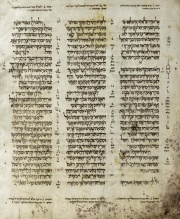Aleppo Codex
From Textus Receptus
| Line 1: | Line 1: | ||
| - | [[Image:Aleppo codex.jpg|thumb|Closeup of Aleppo Codex, Joshua 1:1]] | + | [[Image:Aleppo codex.jpg|thumb|Closeup of Aleppo Codex, [[Joshua 1:1]]]] |
| - | The Aleppo Codex (Hebrew: כֶּתֶר אֲרָם צוֹבָא, kɛθɛɾ ʔăɾɔm sˁovɔʔ, Keter Aram Soba) is the most complete extant version of the Hebrew Bible. The codex was written in the 10th century CE. | + | The Aleppo Codex (Hebrew: כֶּתֶר אֲרָם צוֹבָא, kɛθɛɾ ʔăɾɔm sˁovɔʔ, Keter Aram Soba) is the most complete extant version of the [[Hebrew Bible]]. The codex was written in the 10th century CE. |
| - | It is considered the most authoritative document in the masorah ("transmission"), the tradition by which the Hebrew Scriptures have been preserved from generation to generation. Surviving examples of responsa literature show that the Aleppo Codex was consulted by far-flung Jewish scholars throughout the Middle Ages, and modern studies have shown it to be the most accurate representation of Masoretic principles in any extant manuscript, containing very few errors among the millions of orthographic details that make up the Masoretic text. Thus, the Aleppo Codex is seen as the most authoritative source document for both the original biblical text and its vocalization (cantillation). | + | It is considered the most authoritative document in the masorah ("transmission"), the tradition by which the Hebrew Scriptures have been preserved from generation to generation. Surviving examples of responsa literature show that the Aleppo Codex was consulted by far-flung Jewish scholars throughout the Middle Ages, and modern studies have shown it to be the most accurate representation of [[Masoretic]] principles in any extant manuscript, containing very few errors among the millions of orthographic details that make up the Masoretic text. Thus, the Aleppo Codex is seen as the most authoritative source document for both the original biblical text and its vocalization (cantillation). |
[[Image:Aleppo Codex Deut.jpg|thumb|Page from Aleppo Codex, Deuteronomy]] | [[Image:Aleppo Codex Deut.jpg|thumb|Page from Aleppo Codex, Deuteronomy]] | ||
Revision as of 19:45, 14 August 2009

The Aleppo Codex (Hebrew: כֶּתֶר אֲרָם צוֹבָא, kɛθɛɾ ʔăɾɔm sˁovɔʔ, Keter Aram Soba) is the most complete extant version of the Hebrew Bible. The codex was written in the 10th century CE.
It is considered the most authoritative document in the masorah ("transmission"), the tradition by which the Hebrew Scriptures have been preserved from generation to generation. Surviving examples of responsa literature show that the Aleppo Codex was consulted by far-flung Jewish scholars throughout the Middle Ages, and modern studies have shown it to be the most accurate representation of Masoretic principles in any extant manuscript, containing very few errors among the millions of orthographic details that make up the Masoretic text. Thus, the Aleppo Codex is seen as the most authoritative source document for both the original biblical text and its vocalization (cantillation).
See also

